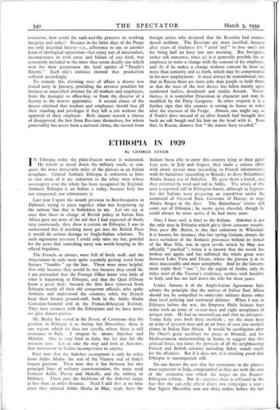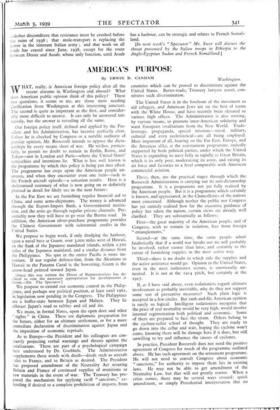ETHIOPIA IN 1939
By GEORGE STEER
IN Ethiopia today the philo-Fascist writer is welcomed. He travels at speed down the military roads, or con- quers the more intractable miles of the plateau in an Italian aeroplane. Central Amharic Ethiopia is unknown to him; as vast areas of it are unknown to the white men whose sovereignty over the whole has been recognised by England. Amharic Ethiopia is an Italian x today, because Italy has not conquered, nor administers it.
Last year I spent the month previous to Berchtesgaden in Djibouti, trying to piece together what was happening up the railway line that is forbidden to me. Let me say at once that those in charge of British policy in Italian East Africa gave me none of the aid that I had expected of them; very courteously, they drew a curtain on Ethiopia; I was to understand that if anything nasty got into the British Press it would do serious damage to Anglo-Italian relations. To such ingenuous yes-men I could only raise my hat, grateful for the news that something nasty was worth keeping in the official frigidaire.
The French, as always, were full of lively stuff, and the Abyssinians in exile were quite regularly getting word from literary " bandits " up the line. These were more helpful. Not only because they would be but because they could be. I am persuaded that the Foreign Office know very little of what is happening in Ethiopia, and that the Quai d'Orsay know a great deal: because the first have removed from Ethiopia nearly all their old competent officials, who spoke Amharic and understood the country; while the French keep their former ground-staff, both in the Addis Ababa Consulate-General and in the Franco-Ethiopian Railway. They have contacts with the Ethiopians and we have none; we give dinner-parties.
Mr. Butler has stated in the House of Commons that the position in Ethiopia is as during last November; there is one region, which he does not specify, where there is still resistance to Italy. I imagine he means Ankober and Mindjar. One is very kind to Italy, but let that for the moment pass. Let us take the map and look at Ankober, that monument to Italian incompetence in empire.
First note that the Ankober escarpment is only 6o miles from Addis Ababa, the seat of the Viceroy and of Italy's largest garrison. Then note that it lies between her two principal lines of military communication, the main road between Addis, Dessie and Makalle, and the railway to Djibouti. These pass the backbone of the Ankober range at less than 25 miles distance. Need I add that at no time since they entered Addis Ababa in May, 1936, have the Italians been able to enter this country lying at their gate? Last year, in July and August, they made a serious effort with about 20,000 men (according to French information), with 6o battalions (according to British), to drive Balambaras Ababa Aragai out of Ankober. He gave them a knock, and they returned by road and rail to Addis. The whe_e of this area is reported still in Ethiopian hands, although in Septem- ber the Italians were preparing an expedition under the command of General Nasi, Governor of Harrar, to wipe Ababa Aragai in the dust. The Balambaras' letters still come out of Ethiopia ; he seems quite cheerful, though he could always be more active if he had more arms.
One, I have said, is kind to the Italians. Ankober is not the only area in Ethiopia which gives them constant trouble. Nor, pace Mr. Butler, is this fact unknown in Whitehall. It is known, for instance, that last spring Goj jam, always the most turbulent of the Amharic provinces behind its trench of the Blue Nile, was in open revolt, which by May was officially " pacified "; today it is known that the revolt has broken out again, and has inflamed the whole great zone between Lake Tana and Dessie, where the plateau is at its most inaccessible and most xenophobe. And let the Govern- ment triple their " one "; for the region of Ambo, only 6o miles west of the Viceroy's residence, seethes with hostility to Italy, and has not laid down the rifle for three years.
Under Annexe 6 of the Anglo-Italian Agreement Italy admits the principle that the natives of Italian East Africa should not be compelled to undertake military duties other than local policing and territorial defence. When I was in Ethiopia before the war, the Emperor Haile Selassie kept order with an army of ro,000 men and eight aeroplanes of antique style. He had no mustard-gas and shot no prisoners. Today Italy uses both these methods ; yet she must keep an army of 200,000 men and an air force of over 200 modern planes in Italian East Africa. It would be sacrilegious after the Duce's great sacrifices for peace at Munich, and for Mediterranean understanding in Spain, to suggest that this co!ossal force, ten times the garrison of all the neighbouring French and British colonies including Aden, stands ready for the offensive. But if it does not, it is standing proof that Ethiopia is unconquered still.
No one knows the cost that her operations in the plateau must represent to Italy, compounded as they are with the cost of the economic war which she wages on the Franco- Ethiopian railway. But the expense sheet is reflected in the fact that she can only afford about two campaigns a year ; that Signor Mussolini sent out strict orders before the last Ankober discomfiture that resistance must be crushed before the rains of 1938 ; that mule-transport is replacing the motor in the itinerant Italian army ; and that work on all roads has ceased since June, 1938, except for the route between Dessie and Assab, whose only function, until Assab has a harbour, can be strategic and relates to French Somali- land.
[In next week's "Spectator" Mr. Steer will discuss the threat presented by the Italian troops in Ethiopia to the Anglo-Egyptian Sudan and French Somaliland.]



























































 Previous page
Previous page